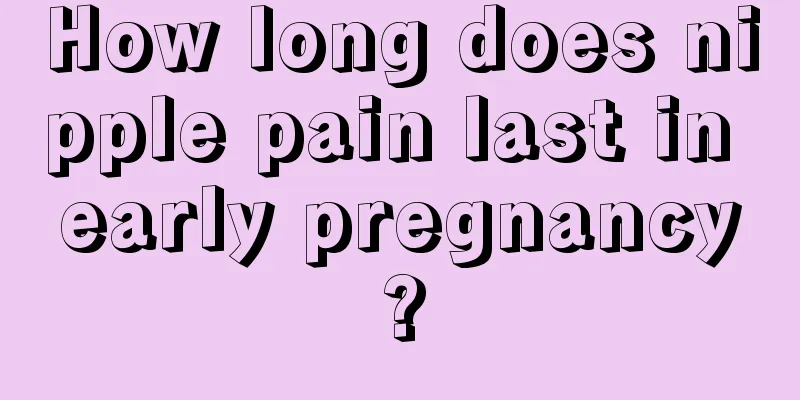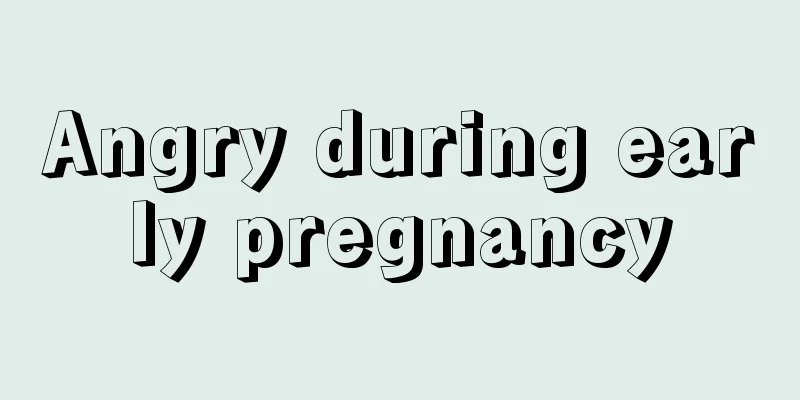How long does nipple pain last in early pregnancy?

|
After a woman becomes pregnant, she will experience various symptoms of discomfort in the early stages of pregnancy. However, these symptoms are normal and you don’t have to worry too much. Because everyone’s body system is different, the symptoms of discomfort in the body are also different. Most pregnant women experience nipple pain in the early stages of pregnancy. In general, how long will nipple pain last in the early stages of pregnancy? How long does nipple pain last during early pregnancy? Breasts are the baby's food supply after birth. Therefore, throughout pregnancy, the development of the breasts changes along with the development of the fetus in order to adapt to the needs of breastfeeding after delivery. Generally speaking, breast pain will be more severe in the 4th to 6th week of pregnancy. Breast tenderness during pregnancy is caused by changes in hormone levels. From the moment the fertilized egg implants into the ovum, the endocrine system in the female body begins to change. Among them, one of the most obvious signs is breast sensitivity and pain. This is due to the increased hormone levels in the pregnant woman's body. This distending pain is very similar to what women feel before their period, but it is more intense. The chest pain will improve significantly after 3 months of pregnancy, because the pregnant woman's body has adapted to the hormonal changes during pregnancy since the second trimester. For breast swelling and pain symptoms after pregnancy, pregnant women can use breast care methods such as hot compresses and massage to relieve them. It is important to note that the breasts are very fragile during this period, and pregnant women should be gentle during care to avoid damaging the nipples. The early pregnancy symptoms vary from person to person due to different physical conditions. Generally speaking, nipple pain in early pregnancy will be relieved in the third month of pregnancy. Expectant mothers can also apply hot compresses to relieve discomfort. Symptoms of early pregnancy 1. Menopause. Amenorrhea is the most obvious sign of early pregnancy. If a woman has a normal menstrual cycle but her period is more than 10 days late, she may be pregnant. 2. Early pregnancy reaction. Early pregnancy reactions usually appear after 6 weeks of pregnancy, including dizziness, fatigue, drowsiness, increased salivation, loss of appetite, nausea and vomiting. 3. After 8 weeks of pregnancy, you may experience an increase in the frequency of urination. 4. Breast changes: After pregnancy, under the joint stimulation of estrogen and progesterone, the breasts of pregnant women will gradually grow larger starting from the eighth week, the color of the nipples and areola will deepen, and there will be dark brown nodules around the nipples. 5. Changes in basal body temperature. A woman's normal basal body temperature is a bidirectional curve, that is, it is lower before ovulation and higher after ovulation. If the menstrual period does not come when it is due, and the body temperature does not drop after rising and remains for more than 18 days, you are pregnant. |
<<: Is it normal for the fetus to move frequently at 33 weeks of pregnancy?
>>: What causes frequent fetal movements?
Recommend
Why does my stomach hurt after wearing the ring?
Stomach pain is pain in our abdomen. There are ma...
Pregnant women breathe formaldehyde for 8 hours a day
The bodies of pregnant women are more special tha...
Zhou Haimei's cause of death announced! Beware of the signs of a heart "strike", especially for those living alone!
Recently, Zhou Feng, the sister of the famous act...
Can I eat cola chicken wings often? Are there any harms?
The surface of cola chicken wings is golden and r...
Pictures of women suffering from anal eczema
It is very distressing for women to suffer from p...
Tips for pregnant women who can't cough up phlegm
Coughing is a very common symptom of the disease....
How to make sticky popcorn with sugar? How to make popcorn with rice in a frying pan?
Popcorn contains rich plant protein, amino acids,...
Is Pu'er tea acidic or alkaline? Why does Pu'er tea have white foam when it is brewed?
Pu'er tea is a kind of health tea. It is neit...
What to do if a woman's palms and soles are hot
What is the reason for hot hands and feet? Nowada...
Luo Yunbo: Near-expiry food is hotly debated, the market is hot but don’t let it go bad
Professor Luo Yunbo Honorary Vice President of Ch...
How long does it take to do B-ultrasound after abortion?
After an abortion, you should go to the hospital ...
How long does it take to recover from medical abortion?
If the pregnancy is relatively short and has not ...
How to increase female sexual desire
Female sexual dysfunction refers to the lack of s...
Summer diet "minefields": Don't be greedy for these kidney-damaging foods!
1. High-salt foods In summer, people often like t...









